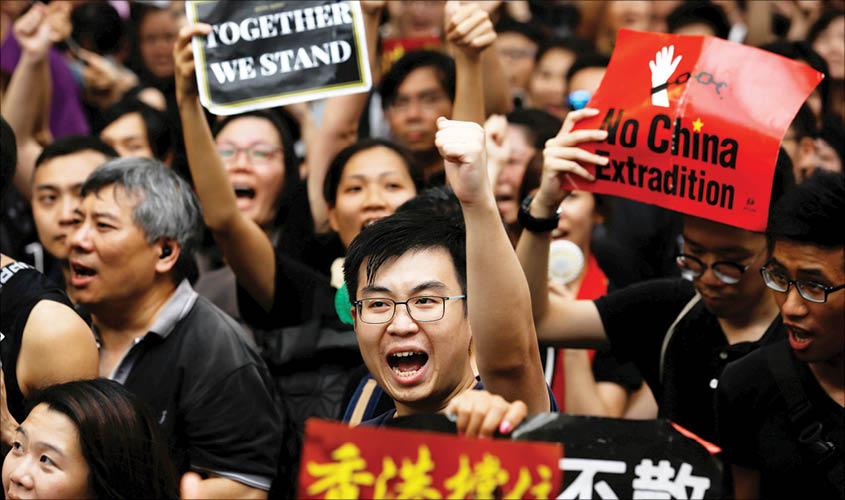The ‘movement’ to erode the sovereignty of Hong Kong produced strong emotions and anger.
Events in Hong Kong, a few days back attracted worldwide attention. The protesters were mostly young men, women and a large contingent of students. The “movement” to erode the sovereignty of Hong Kong produced strong emotions and anger. The people by and large felt that the 1997 agreement on the five-decade future of the island was being tampered with. What provoked the protests was an announcement by the Beijing selected CEO, Carrie Lam. Eventually she had to give in to the demands of the protesters, saying that the extradition legislation was “effectively dead”.
The million or more who marched through the city displayed enormous courage. In my view, in future the CEO has to act with more tact and protesters should not take Beijing’s patience for granted.
There is talk of Shanghai as an alternative to Hong Kong. Shanghai does not enjoy the special status that Hong Kong does.
I first set foot in Hong Kong on 30 June 1956. I spent 24 hours in the city. Bought an overcoat and had a suit stitched. The measurements were taken by none else than Mr Harilela, a man in the making. I met him again in 2001, when I accompanied Sonia Gandhi to Hong Kong. She had been invited by Mr Harilela to address the Indian Chamber of Commerce. Harilela, it was all too evident, had become one of the prominent citizens of the city and a very wealthy man.
After completing my tenure in Peking in May 1958 (not yet Beijing). I stopped in Hong Kong, where I met Han Suyin (1916-2012), whom I had got to know when she came to Peking in 1956 for the first time after 1949. Her novel, A Many Splendored Thing sold millions of copies, the world over. The film, Love is a Many Splendored Thing was shot in Hong Kong. The lead actors were Bill Holden and Jennifer Jones. Suyin showed me the places where the film was shot, including the peak of Victoria Hill, from where one got a glorious view of the magnificent Hong Kong harbour. There I made the banal statement, “Here was experience the peace that passeth all understanding.” Han Suyin came up with, “…peace that passeth all misunderstanding.” Touché, I remember saying.
Hong Kong has a chequered history. Hong Kong was leased to Britain in 1842, Kowloon peninsula in 1860, and in 1898 a 99-year lease was signed. During World War II, Japan occupied Hong Kong. Hong Kong ceased being a British colony in 1997. The ceremony of transfer of Hong Kong to China was attended by Prince Charles, representing his mother. From Beijing came President Jiang Zemin.
* * *
Three well known, enlightened Congressmen have made eminently wise suggestions to resolve the deep and distressing crisis the Congress party is not dealing with. The complacency of the Gandhis is incomprehensible. Their attitude reminds me of the French saying. “plus ça change, plus c’est la même chose.” The English translation is, “The more you change things, the more they remain the same.’
Dr Karan Singh, Punjab Chief Minister Amarinder Singh and former Congress MP, Jyotiraditya Scindia have deplored the delay in the election, installation and appointment of a Congress president. But is anyone listening? All three agree that “the torch be passed to the younger generation”—to paraphrase John F. Kennedy. Who is causing the delay? It is amazing that the Congress Working Committee has not met since Rahul Gandhi announced his resignation. Or, is the CWC waiting for a signal from 10 Janpath or 12 Tuglaq Road. Consequence. Delaying a decision is proving to be a self-inflicted disaster.
* * *
Nehru Saga by Arun Bhatnagar was published early this week. The author is a Stephanian and he retired as Secretary in the Central government. He is the grandson of Sir Shanti Swarup Bhatnagar (1894-1955), a scientist close to Jawaharlal Nehru.
To my pleasure and surprise the Preface opens with a reference to me: “The title, relevance and inspiration of this book flows from the contents of a letter Prime Minister Indira Gandhi sent on 26th May, 1962, to K. Natwar Singh, IFS, then the envoy to Poland, about what she, termed the ‘Nehru Saga’.”

